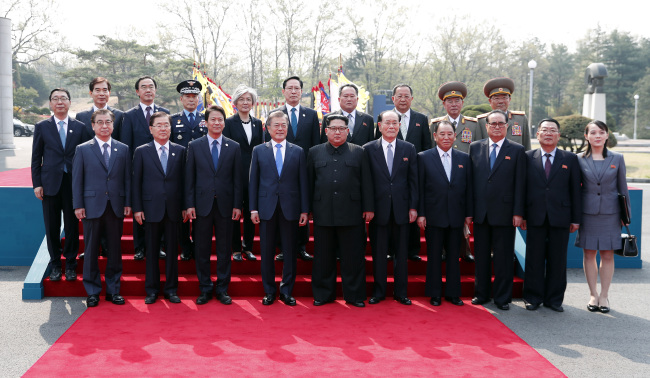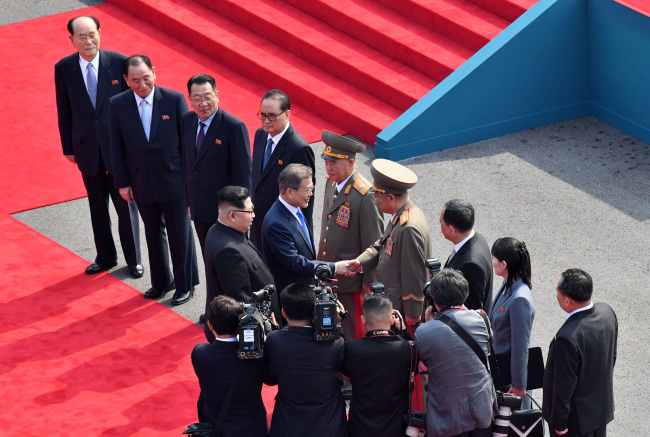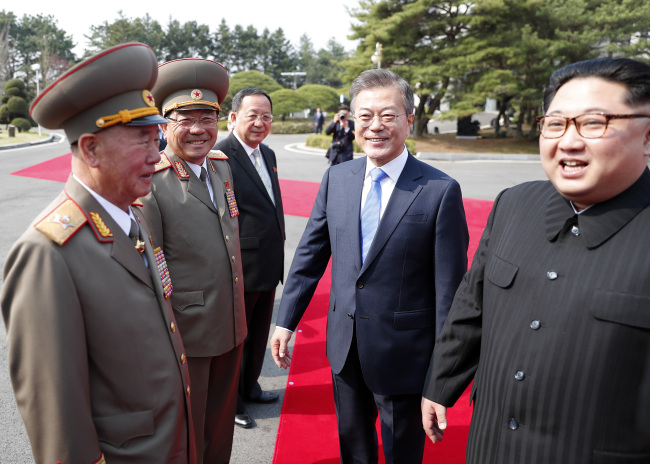South Korean President Moon Jae-in and North Korean leader Kim Jong-un were accompanied by the most powerful officials from their countries at the inter-Korean summit held Friday at the truce village of Panmunjeom.
Attention was on the four officials who joined Moon and Kim for the morning session of the inter-Korean summit on the second floor of the Peace House -- Kim Yo-jong, Kim’s younger sister, and Kim Yong-chol, vice chairman of the ruling Workers’ Party of Koreas, from the North, and Im Jong-suk, presidential chief of staff, and Suh Hoon, chief of the National Intelligence Service, from the South.
 |
(Cheong Wa Dae) |
 |
(Cheong Wa Dae) |
 |
(Cheong Wa Dae) |
The four figures played a major role in creating momentum for dialogue and peace between the two Koreas during and after the PyeongChang Winter Olympics.
Kim Yo-jong, who delivered the North Korean leader’s handwritten letter to President Moon as his special envoy in February, was spotted closely escorting her brother from the moment the reclusive leader stepped onto South Korean soil. Kim Yo-jong, who serves as director of propaganda and agitation at the Workers’ Party of Korea, is considered Kim’s de facto chief of staff.
Despite being suspected of having orchestrated the attack on the South Korean naval vessel Cheonan in 2010, Kim Yong-chol also played a part in creating a conciliatory mood, traveling to South Korea to attend the PyeongChang Olympics’ closing ceremony and holding meetings with key South Korean officials to continue the momentum for peace.
Suh Hoon is thought to be Kim’s counterpart, closely communicating with North Korean officials to arrange the inter-Korean summit. He is also thought to be maintaining close coordination with his American counterpart, Mike Pompeo, newly appointed US secretary of state who served as director of the Central Intelligence Agency before assuming his new post.
Presidential chief of staff Im and President Moon’s closest aide, also sat next to Moon in the morning session of the summit. He headed the inter-Korean summit preparation committee.
A total of nine senior party, military and government officials joined the North’s delegation. In an unprecedented move, high-ranking military officials and diplomats were included in the list for the inter-Korean summit, which experts saw as a move to prepare for the upcoming North Korea-US summit to be held in May or early June where the North’s denuclearization is expected to top the agenda.
The inclusion of Ri Su-yong, who is in charge of international affairs for the party, and Ri Yong-ho, North Korea’s foreign minister, in the delegation was seen as Kim preparing himself for possible talks on denuclearization, experts said.
“Including Ri Su-yong and Ri Yong-ho was unimaginable in the past, because including them means that the North acknowledges two Koreas on the peninsula,” said Yang Moo-jin, a professor at the University of North Korean Studies.
“Leaving all that behind, Kim appears to have chosen to bring them to the summit in case their conversation touches on North Korea-US relations or nuclear weapons programs,” he said, adding Kim also wants to show that his country is being run like a “normal country.”
On the military side, Ri Myong-su, the chief of Korean People’s Army General Staff and Minister of People’s Armed Forces Pak Yong-sik accompanied the young leader.
South Korea’s last- minute inclusion of Jeong Kyeong-doo, the chairman of the Joint Chiefs of Staff, signals a possible beginning of talks to reduce arms between the Koreas, said Cho Sung-ryul, a senior research fellow at the Institute for National Security Strategy.
“In North Korea, Ri Myong-su and Pak Yong-sik are the ones who could discuss a range of reduction of arms and demilitarization of the Korean Demilitarized Zone measures,” he said.
The North’s delegation also included Kim Yong-nam, North Korea’s ceremonial head of state, Choe Hwi, vice chairman of the ruling Workers’ Party of Korea’s central committee and chief of the North’s national sports guidance commission, Ri Son-gwon, the chairman of the Committee for the Peaceful Reunification of the Country, North Korea’s state agency in charge of inter-Korean affairs.
Kim Yong-nam, who led the North’s delegation to the PyeongChang Olympics’ opening ceremony, attended the previous two inter-Korean summits in 2000 and 2007, accompanying Kim’s father Kim Jong-il.
“Kim Yong-nam’s participation was also unexpected. It could signal the North’s intention to diversify dialogue channels and consideration of a situation where the two sides need to get approval from their respective parliaments,” said Kyungnam University professor Kim Dong-yub.
From South Korea, the delegation also included Chung Eui-yong, national security adviser, who visited Pyongyang earlier this year as Moon’s special envoy. He traveled to the US last month to deliver the North Korean leader’s invitation for a summit to US President Trump, which Trump accepted on the spot.
Other officials from South Korea included Unification Minister Cho Myoung-gyon, Defense Minister Song Young-moo, and Foreign Minister Kang Kyung-wha.
By Ock Hyun- ju (
laeticia.ock@heraldcorp.com)







![[Herald Interview] 'Trump will use tariffs as first line of defense for American manufacturing'](http://res.heraldm.com/phpwas/restmb_idxmake.php?idx=644&simg=/content/image/2024/11/26/20241126050017_0.jpg)

![[Exclusive] Hyundai Mobis eyes closer ties with BYD](http://res.heraldm.com/phpwas/restmb_idxmake.php?idx=644&simg=/content/image/2024/11/25/20241125050044_0.jpg)
![[Herald Review] 'Gangnam B-Side' combines social realism with masterful suspense, performance](http://res.heraldm.com/phpwas/restmb_idxmake.php?idx=644&simg=/content/image/2024/11/25/20241125050072_0.jpg)